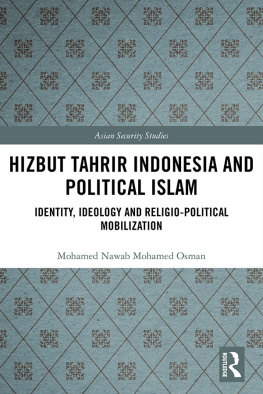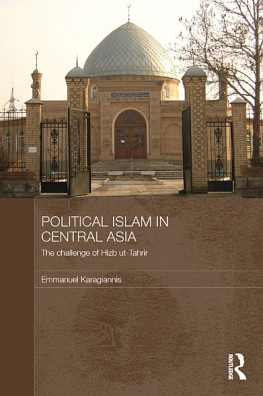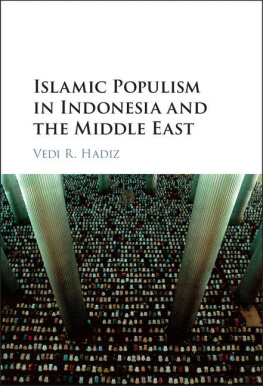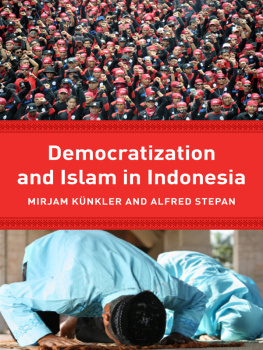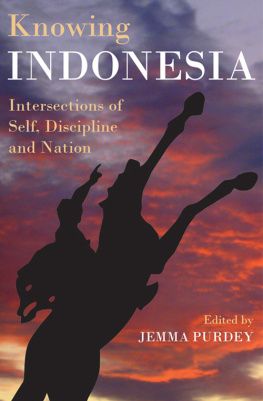This is a terrific book, likely to be widely cited as the best if not the definitive study of Hizbut Tahrir Indonesia (HTI), an Islamist organization recently banned by the Indonesian government. A main strength is the high quality of the interviews, conducted with more than 100 HTI leaders and members, whose confidence the author clearly gained. Balanced and analytical, the book is also theoretically innovative, bringing a new conceptualization of ideology to social movement theory. Not least, its substantive conclusion that HTI is non-violent is persuasive, showing why the recent ban is likely to be counter-productive.
Bill Liddle, The Ohio State University, USA
Nawab has captured the inner workings of a global Islamist ideological movement and how it lands in a populous nation like Indonesia. The Hizbut Tahrir is an incubator group for a variety of trends within contemporary Islam and highly relevant to our understanding of the intersection of religion and politics. Fascinating details of internal conflict, rivalries and the jockeying for power emerge in this well-researched and deserving book.
Ebrahim Moosa, Professor of Islamic Studies, Keough School of Global Affairs,University of Notre Dame, USA
Mohamed Nawab Mohamed Osman wrote a very original and ground-breaking book: he shows how a specific form of Islamist radicalization came to Indonesia from the West; his book illustrates the sudden shift from traditional home-grown Muslim movements, well rooted into the Indonesian culture and society, to a global phenomenon of religious radicalism that finds an appeal among a youth that has lost its connexion to the past.
Olivier Roy, Professor of Politics, Robert Schuman Centre for Advanced Studies,Firenze, Italy
Hizbut Tahrir Indonesia and Political Islam
This book offers a timely examination of Hizbut Tahrir Indonesia (HTI), a chapter of the transnational movement Hizb ut-Tahrir (HT), whose key aim is the revival of the caliphate.
It cautions against an overly simplistic read of a group like HTI and political Islam in Indonesia. While there is much to laud, particularly with regard to how leaders in Indonesia have attempted to counteract Islamist extremism, insofar as the trajectory of non-violent Islamism in Indonesia is concerned there are clear reasons for apprehension. Groups like the HTI have been adept at using the democratic space in Indonesia to propound their illiberal objectives, including encouraging the curtailment of Indonesian art forms deemed un-Islamic, and more importantly pushing for certain Islamic sects, such as the Ahmadiyahs, to be banned. Yet, despite its extreme posturing, HTI is accepted as a mainstream Muslim organization. As such, the Indonesian chapter of Hizb ut-Tahrir represents a unique case: unlike other chapters, which are deemed extreme and fringe, HTI, though radical, still exists within the space provided by the Indonesian religio-political landscape.
This book offers new insights into HTIs history, organizational structure and ideology, adding considerable new details about HTI and correcting errors in existing literature, while directing its primary focus on explaining HTIs rapid growth in Indonesia. The central argument is that the key to understanding HTIs growth lies in the role collective identity plays in attracting new members and retaining its existing members within the party. Factors such as institutional and non-institutional opportunities within the Indonesian political system, HTIs resource mobilization strategies and the anti-systemic ideology of HTI serve as political, organizational and religious incentives for individuals to join the party and launch collective action. This goes on to emphasize and show that collective identity remains the most crucial factor in the partys growth. Analysing this process of collective identity formation and its impact on recruitment and membership retention is central to this book.
This book will be of much interest to students of Southeast Asian politics, regional security, political Islam, and International Relations in general.
Mohamed Nawab Mohamed Osman is Assistant Professor and Coordinator of the Malaysia Program at the S. Rajaratnam School of International Studies, a Graduate School of Nanyang Technological University, Singapore.
Asian Security Studies
Series Editors:
Sumit Ganguly
Indiana University, Bloomington
Andrew Scobell
Research and Development (RAND) Corporation, Santa Monica
Joseph Chinyong Liow
Nanyang Technological University, Singapore
Few regions of the world are fraught with as many security questions as Asia. Within this region it is possible to study great power rivalries, irredentist conflicts, nuclear and ballistic missile proliferation, secessionist movements, ethnoreligious conflicts and inter-state wars. This book series publishes the best possible scholarship on the security issues affecting the region, and includes detailed empirical studies, theoretically oriented case studies and policy-relevant analyses as well as more general works.
Regional Institutions, Geopolitics and Economics in the Asia Pacific
Evolving Interests and Strategies
Edited by Steven B. Rothman, Utpal Vyas and Yoichiro Sato
Chinese-Japanese Competition and the East Asian Security Complex
Vying for Influence
Edited by Jeffrey Reeves, Kerry Lynn Nankivell and Jeffrey Hornung
China and the Senkaku/Diaoyu Islands Dispute
Escalation and De-escalation
Balazs Szanto
China and Nordic Diplomacy
Edited by Bjrnar Sverdrup-Thygeson, Wrenn Yennie Lindgren and Marc Lanteigne
Indonesias Foreign Policy and Grand Strategy in the 21st Century
Rise of an Indo-Pacific Power
Vibhanshu Shekhar
Hizbut Tahrir Indonesia and Political Islam
Identity, Ideology and Religio-Political Mobilization
Mohamed Nawab Mohamed Osman
First published 2018
by Routledge
2 Park Square, Milton Park, Abingdon, Oxon OX14 4RN
and by Routledge
711 Third Avenue, New York, NY 10017
Routledge is an imprint of the Taylor & Francis Group, an informa business
2018 Mohamed Nawab Mohamed Osman
The right of Mohamed Nawab Mohamed Osman to be identified as author of this work has been asserted by him in accordance with sections 77 and 78 of the Copyright, Designs and Patents Act 1988.
All rights reserved. No part of this book may be reprinted or reproduced or utilized in any form or by any electronic, mechanical, or other means, now known or hereafter invented, including photocopying and recording, or in any information storage or retrieval system, without permission in writing from the publishers.
Trademark notice: Product or corporate names may be trademarks or registered trademarks, and are used only for identification and explanation without intent to infringe.
British Library Cataloguing-in-Publication Data
A catalogue record for this book is available from the British Library
Library of Congress Cataloging-in-Publication Data
Names: Mohamed Nawab, author.
Title: Hizbut Tahrir Indonesia and political Islam : identity, ideology and religio-political mobilization / Mohamed Nawab Mohamed Osman.

